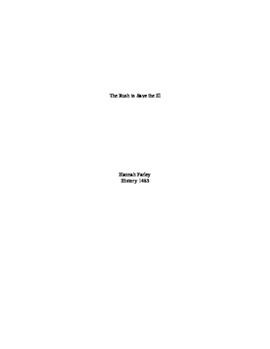| dc.creator | Farley, Hannah | |
| dc.date | 2017 | |
| dc.date.accessioned | 2018-03-05T23:57:10Z | |
| dc.date.accessioned | 2021-04-14T15:26:27Z | |
| dc.date.available | 2018-03-05T23:57:10Z | |
| dc.date.available | 2021-04-14T15:26:27Z | |
| dc.identifier.uri | https://hdl.handle.net/11244.46/1400 | |
| dc.description | David W. Levy Prize finalist, Fall 2017 | |
| dc.description.abstract | Benjamin Rush is not to be dismissed as history has shown-his extensive medical training and experience, when contextualized within his own time, was highly beneficial to the people of Philadelphia during the summer 1793 yellow fever outbreak. In the late summer months, a lethal fever swept its way from the docks of America's capital to the heart of the city. From the beginning of August until November, four thousand and forty-four individuals died from the outbreak. This killed a tenth of Philadelphia's 50,000 citizens with half of that population escaping to the countryside. Among those who stayed behind, many encompassed the city's physicians including Dr. Benjamin Rush-signer of the Declaration of Independence, surgeon general of the Continental Army, and chair of the Institutes of Medicine and Clinical Practice at the University of Philadelphia. | |
| dc.format.extent | 10 pages | |
| dc.format.extent | 113,536 bytes | |
| dc.format.medium | application.pdf | |
| dc.relation.requires | Adobe Acrobat Reader | |
| dc.subject | David W. Levy Prize | en_US |
| dc.subject.lcsh | Rush, Benjamin, 1746-1813 | en_US |
| dc.subject.lcsh | Physicians -- United States -- Biography | en_US |
| dc.subject.lcsh | Yellow fever -- Pennsylvania -- Philadelphia -- History -- 18th century | en_US |
| dc.title | The rush to save the ill | |
| dc.type | Document | |
| dc.type.material | text | |
| dc.contributor.sponsor | Gilje, Paul | |
| dc.contributor.sponsor | Truden, John | |
| dc.description.undergraduate | undergraduate | |
